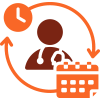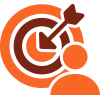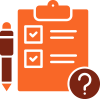

Your pathway to medical practice in Germany/Austria/Switzerland
Specialized German courses for medical professionals – from patient history taking to advanced clinical communication.
Prepare yourself professionally to communicate confidently with patients and colleagues in the healthcare system of German-speaking countries.
General Features:
- 30 hours of live instruction per course (15 live online sessions of 2 hours each).
- Recordings of all sessions.
- Certificate of participation.
- Based on "Menschen im Beruf - Medizin" (Hueber)
- Instructors with extensive experience teaching Medical German.
- Small groups (max. 12 participants).
- Requirement: Minimum German level B2 completed.


Why Medical German?
Your Advantages
Improve your career prospects as a physician in German-speaking countries.
Develop linguistic competencies in the medical field in German.
Communicate professionally with patients, their families, and colleagues.
Practice with typical scenarios from daily clinical practice.
Conduct medical reports, admission interviews, and ward round situations.
Learn medical terminology systematically.
Understand the cultural specifics of the healthcare system in German-speaking countries.


Requirements Section
This is NOT a general German course.
To participate in our Medical German B2/C1 courses, you need at least a solid B2 level.
Don't have B2 level yet? Check out our general German courses A1-B2 before enrolling in Medical German.




